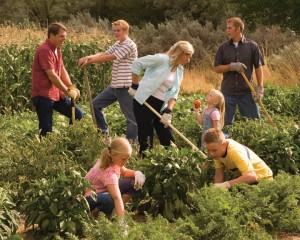Michelle Obama announced this week the White House was planting a garden and growing its own food. While it will be cared for largely by the staff, a group of local school children will also be helping out, as will all members of the Obama family, including the president. This is the first full vegetable garden since Eleanor Roosevelt planted a victory garden and encouraged others to do so as well. The purpose of that garden was to make sure there was enough food during wartime.
 Today’s garden announcement was made to encourage healthy, organic, and locally grown eating, and the garden, placed near the Obama children’s swing set, is especially meant to encourage children to eat well. However, when the country is in the midst of a recession, a garden is also a way for families to cut food costs without resorting to cheap, but unhealthy alternatives.
Today’s garden announcement was made to encourage healthy, organic, and locally grown eating, and the garden, placed near the Obama children’s swing set, is especially meant to encourage children to eat well. However, when the country is in the midst of a recession, a garden is also a way for families to cut food costs without resorting to cheap, but unhealthy alternatives.
The Mormons have been promoting gardening for many decades. They teach their members to build a food storage against hard times, and a garden is a part of that plan, creating a renewable food source that cuts costs and provides fresh food even in difficult times. A former Mormon prophet named Spencer W. Kimball said, “We encourage you to grow all the food that you feasibly can on your own property. Berry bushes, grapevines, fruit trees-plant them if your climate is right for their growth. Grow vegetables and eat them from your own yard. Even those residing in apartments … can generally grow a little food in pots and planters. Study the best methods of providing your own foods. Make your garden … neat and attractive as well as productive. If there are children in your home, involve them in the process with assigned responsibilities” (in Conference Report, Apr. 1976, 170-71; or Ensign, May 1976, 124).
President Hinckley, having spent his childhood summers on the family farm, was a strong advocate of gardening, but other leaders have also encouraged it. Growing your own food allows you to eat a healthier diet with food grown locally and in season. After the initial start up costs, which can be small, the costs are minimal. In a time when you might be too ill or too poor to shop, it’s reassuring to have fresh food right outside your door. Even if you keep a supply of food for hard times, people in this situation often find themselves longing for fresh produce.
In addition, gardening is good for children. It teaches them hard work and responsibility, since a garden cannot be neglected. It’s meaningful teaching with very tangible results the children can actually eat.
To get children excited about the new family garden, let them participate in the planning. When my children planted their first garden, each of them chose one food to plant and care for. Because it was something they enjoyed, they were eager to take care of it and to share the harvest with their siblings and parents.
If you’re able, grow enough for yourself and a little to share with your neighbors, a food bank, or someone in need. By doing so, you increase the value of your garden. Now, you’re not only teaching hard work, responsibility, and respect for nature, you’re also teaching Christ-like service. Document the project in pictures and make a fuss over the results. When a child grows his own food, he is more likely to eat it, and there is great pride in watching everyone else enjoy the food the child grew. Follow the harvest with cooking lessons, allowing the child to create a product from seed to table.
If you’re Mormon, teach your children the song, “The Prophet Said to Plant a Garden.” If you’re not, you might substitute the words “the prophet” with the words First Lady and sing the song anyway.
About Terrie Lynn Bittner
The late Terrie Lynn Bittner—beloved wife, mother, grandmother, and friend—was the author of two homeschooling books and numerous articles, including several that appeared in Latter-day Saint magazines. She became a member of the Church at the age of 17 and began sharing her faith online in 1992.



Thank you for writing this article. It was a great summary of all the good reasons why bothering to grow a garden is worth it!